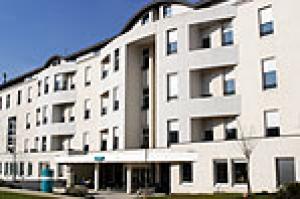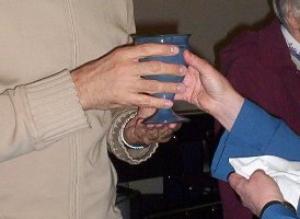In 2004 the Prioress of the Sisters Deaconesses, Sister Evangeline, expressed the following wish to the Major Women Superiors of
How do I fit into this community in Reuilly?
Two or three times a week I am present in the Community taking part in the liturgy (that of Taizé). Because of my presence there is a Eucharist once a month in the Foundation Chapel and once a month a non-Catholic Communion Service. Having prayed together, we live these powerful moments in fidelity and obedience to our respective communities by abstaining from communicating. These times are painful reminders of the suffering of our divisions even though, in community, we live in fraternal communion.
What is an Ecumenical Chaplaincy and how does it work?
 The Chaplaincy is situated in the
The Chaplaincy is situated in the
I have had many meetings with different sick people. I would like to share two of them with you:
“One day the social worker looked for me to tell me about a patient in a difficult situation. He had no fixed abode, was prostrate, sad and mute. After several tries a dialogue began. The man was alone in the world. Wishing to return to his country by car with his wife and children, he was in a car accident and lost all three of them. Everything in his life was turned upside down. I put him in touch with the social assistant who did everything to help him to start again and that is what happened.”
“On another occasion in the intensive care unit, I met a person who had undergone a serious operation. I could sense her upset; she was not able to express it. To try to make contact with her I took her hand, looked at her and remained at her bedside for a long while. It was a long, dense and intensive moment. When she left the hospital she sent me a card which said, “Your look and your hands on the day after my operation at the deaconesses’ hospital are always in my head and give me the courage to keep up the struggle.”
When a death occurs the chaplaincy team is asked to be present for the placing of the body in the coffin. One day I was alone to respond to the call for a celebration of the coffining of a young woman, mother of several young children. Not knowing what religion she was, I would have to improvise, what would I do? Someone, who must have been close to her, came and made the sign of the cross over the corpse. I understood that the family was catholic and I celebrated the catholic rite.
The Chaplains also programme regularly a Service of Remembrance. This is an ecumenical service that brings together the families of the deceased, Jews, Muslims, Orthodox, Protestants and Catholics. After the service the doctors, the other medical staff, Sisters, volunteers and chaplains all meet again over a meal. This is a special time for sharing and catching up.
Our chaplaincy meetings are many and varied, always in the spirit of getting to know each other better and accepting each other with our differences. Every two years we have a week’s training. This year the theme was “Chaplaincy Practice in Europe” and was held in
As Lent drew near an outing was organised. We went to Vezelay for four days. We had the Ash Wednesday celebrations in the Franciscans’ hermitage and in the evening with the monks and nuns of
This year three of the Sister Deaconesses came to the Chrism Mass in the sports stadium in
What have I discovered from my life in this Protestant community?
The importance of being close, open, of mutual enriching, and the discovery of fraternal communion with other Churches. As a Sister of this community often says to me, “Truly it is not impossible to live together,” and another: “With the presence of Sister Marie-Lucie, a catholic religious of the Holy Family of Bordeaux our community has taken on an ecumenical colour which we hold on to with all our heart: nothing can replace the experience of lives that have been intertwined for the advance of the laborious path to unity.”
Sr Marie Lucie Harmann
![]()


